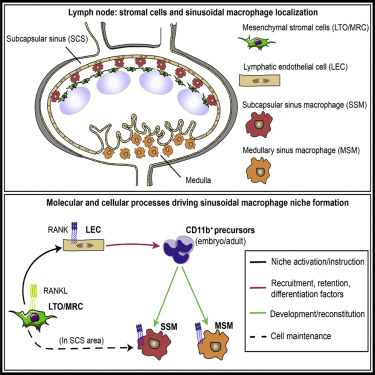Immunity ( IF 32.4 ) Pub Date : 2019-06-11 , DOI: 10.1016/j.immuni.2019.05.008 Abdouramane Camara , Olga G. Cordeiro , Farouk Alloush , Janina Sponsel , Mélanie Chypre , Lucas Onder , Kenichi Asano , Masato Tanaka , Hideo Yagita , Burkhard Ludewig , Vincent Flacher , Christopher G. Mueller

|
Tissue-resident macrophages are receptive to specific signals concentrated in cellular niches that direct their cell differentiation and maintenance genetic programs. Here, we found that deficiency of the cytokine RANKL in lymphoid tissue organizers and marginal reticular stromal cells of lymph nodes resulted in the loss of the CD169+ sinusoidal macrophages (SMs) comprising the subcapsular and the medullary subtypes. Subcapsular SM differentiation was impaired in mice with targeted RANK deficiency in SMs. Temporally controlled RANK removal in lymphatic endothelial cells (LECs) revealed that lymphatic RANK activation during embryogenesis and shortly after birth was required for the differentiation of both SM subtypes. Moreover, RANK expression by LECs was necessary for SM restoration after inflammation-induced cell loss. Thus, cooperation between mesenchymal cells and LECs shapes a niche environment that supports SM differentiation and reconstitution after inflammation.
中文翻译:

淋巴结间充质和内皮基质细胞通过RANK-RANKL细胞因子轴协同作用,以塑造正弦巨噬细胞生态位
驻留在组织中的巨噬细胞接受集中在细胞壁ches中的特定信号,这些壁ni指示它们的细胞分化和维持遗传程序。在这里,我们发现淋巴组织组织细胞因子RANKL的缺乏和淋巴结的边缘网状基质细胞的缺失导致了CD169 +的丧失。包括囊下和髓样亚型的正弦巨噬细胞(SM)。在SM的目标RANK缺乏的小鼠中,亚囊SM的分化受到损害。暂时控制淋巴管内皮细胞(LECs)中的RANK去除显示,在胚胎发生过程中和出生后不久,淋巴RANK激活是两种SM亚型分化所必需的。此外,LECs的RANK表达对于炎症诱导的细胞丢失后的SM恢复是必要的。因此,间充质细胞和LECs之间的合作形成了利基环境,支持炎症后SM分化和重建。



























 京公网安备 11010802027423号
京公网安备 11010802027423号